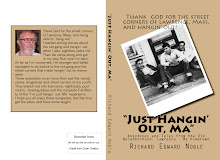 The Hobo Philosopher
The Hobo PhilosopherEliminate welloff-fare
Richard E. Noble
In our Hobo-ing America travels my wife and I sustained ourselves as itinerant farm workers. We camped under farmer’s equipment shelters, under bridges, in a woods or forest, on back streets, in parks, in rest areas, at all night fishing piers, on power line right-of-ways, in abandoned playgrounds and parking lots, in grocery store parking spaces, in back alleys, in rest areas and behind shopping malls. We had no phone, no luxuries, and very little of what is termed disposable income. For most of our fruit picking and migrant career we earned a combined gross income of less than $5,000. I am sure that the majority of you would agree that is not very much money. I think most of you would also concede that for two people to live on that sum of money would be impossible – unless the year was 1942 or earlier. This was during the late seventies and eighties. We survived. I’m not complaining we had a great time. We were living this lifestyle by choice – not from necessity as so many others working beside us.
I find it interesting to point out that during this period of exceptionally low income for us and all our co-workers, we were all required to pay our social security withholding tax. Every farmer made sure he deducted that tax. Every packing house, every cannery or processor, they all took out social security payroll deductions - in some cases even from illegals with false documents. I would like to know where that money was deposited.
At the time it seemed rather ludicrous to me. How did those people in the government in Washington expect us to live, never mind pay into the social security fund? I presumed that the government didn’t care how us folks on the bottom survived. We would pay our social security. And we would pay it no matter how tiny our earnings. In the case of my wife and me we collected no food stamps or any subsidies from any government agency. We had no health care. When we went to a doctor or chiropractor, we paid cash up front. There were no doctors that we meet in our travels that had any other policy. If you had no cash, then you got no pills, no treatment, no prescriptions. There were no free food banks that I can remember and the grocery stores had no discounted programs for low income earners. We paid. We paid everything.
We paid truck repairs and maintenance also. So what is my problem you ask? What do I want a medal?
No I don’t. I would just like everybody to be treated equally.
I don’t understand how the government could demand social security payment from earners making less than $2500 a year and then turn around a give a subsidy to those fortunate individuals who are blessed with incomes of over $100,000 a year.
Is this some kind of a joke?
There is no cap on how little an earner can make and be exempt from social security withholding, but there is a cap for the better-off. The government had no sympathy for those earning less than subsistence but yet it has a guilty conscience when it comes to the better-off, the wealthy and the super wealthy.
I am not complaining that people who have paid more collect more. That’s absolutely right. They paid more, they deserve more. But if the poor can pay on every cent that they earn – no matter how little, then why shouldn’t the rich have to pay on every cent no matter how much. A person should be allowed to pay less because he earns too much? Why shouldn’t everybody be treated the same. Why are the rich being subsidized?
We are talking about the social security tax; I don’t want to hear about all your other rich people problems or expenses. I’ve been listening to that bull all my life. Don’t show me the light bill on your “castle” or the mortgage payment on your mansion. Don’t complain to me about the fuel cost for your helicopter or the air conditioning bill for your chain of gourmet restaurants. I don’t want to hear about your payroll taxes, your property taxes or your income taxes. I could argue about income taxes, fees, licenses, sales taxes and the rest of it, if you would like. But let’s not obfuscate the issue. This is the social security insurance tax. We all pay, we all collect. Social Security is not a welfare program and it was never meant to be. It has been and is still self-sustaining. Any discrepancy in this regard has been caused by government mis-management and book-cooking. As with all insurance programs, if there is a true shortfall then a rate increase is mandatory. But this is not even a matter of a rate increase. This is simply eliminating welloff-fare or loopholes for the better off and the wealthy. This is easy. This is a no-brainer. Eliminate the cap. Everybody pays on every cent they earn – just as the poorest among us have always been required to do.
Richard Edward Noble is a freelance writer and columnist. His local column, the Eastpointer, won the first place 2007 humor award from the Florida Press Association. He has published several books. All of his books can be viewed and purchased on Amazon.com. He can be contacted at richardedwardnoble@gtcom.net for bookstore discounts and volume sales.
















































